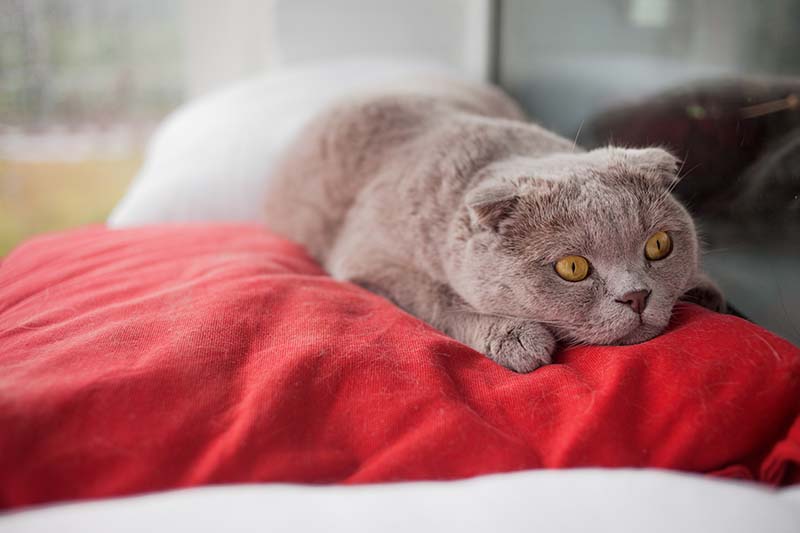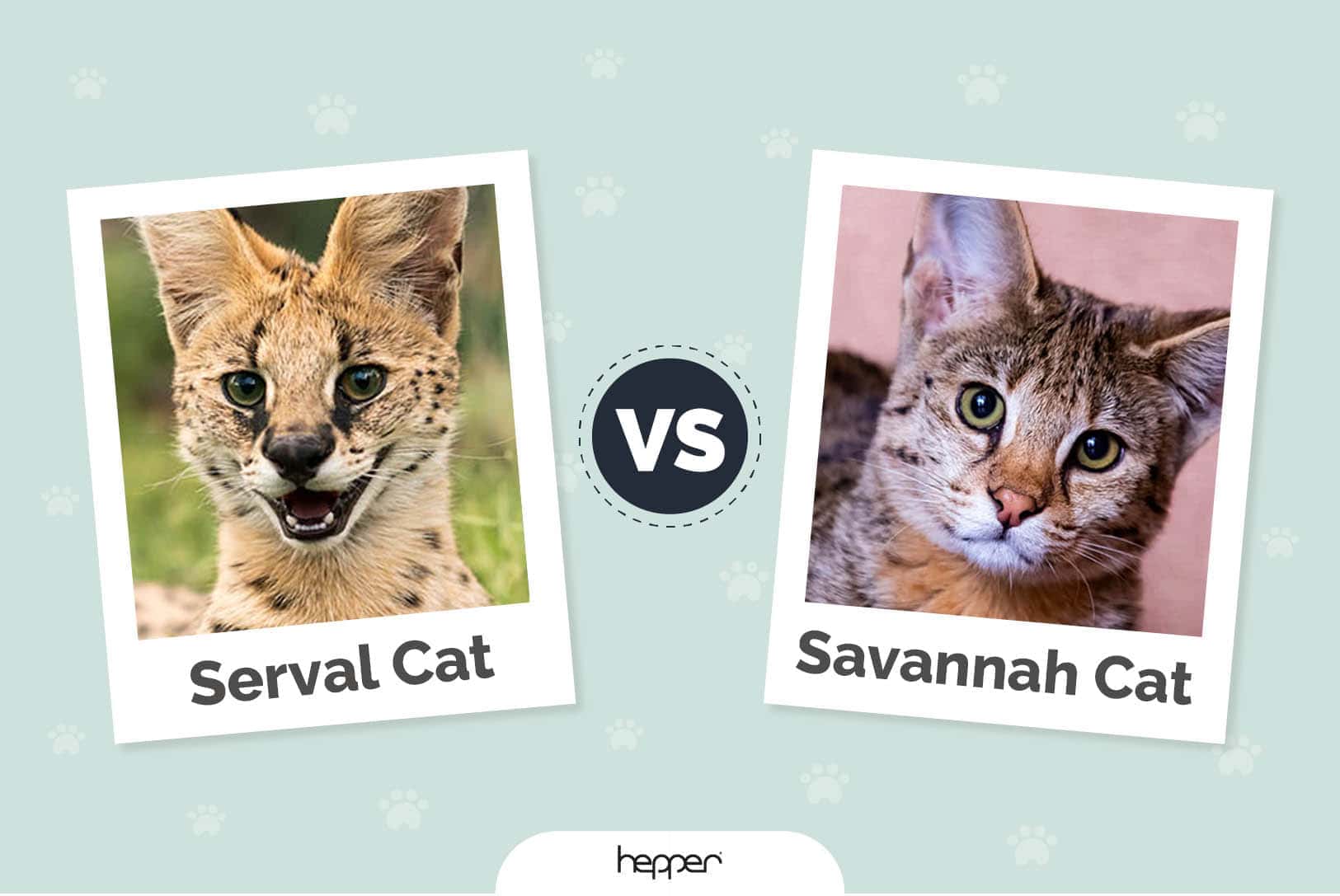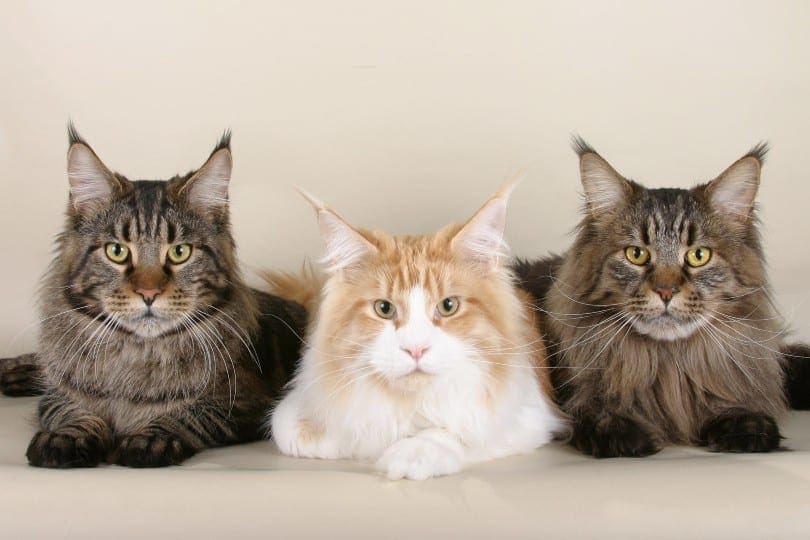Why Are Cats So Scared of Cucumbers? Vet-Verified Reasons
Updated on
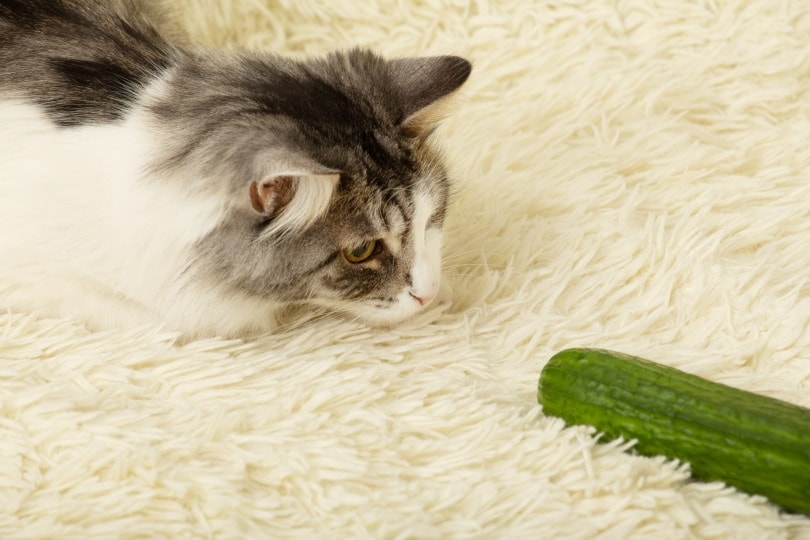
You’ve probably seen one of those videos where a cat jumps straight up in the air when they spot a cucumber nearby. Why are cats afraid of this innocent fruit?
While these videos can be humorous, it’s not recommended that you put a cucumber near your cat while they are eating. It’s believed that cats are afraid of cucumbers because they resemble snakes. But the more likely reason is the unpleasant surprise element.
We look at both theories and why it’s never a good idea to purposefully scare your cat, no matter how funny their reaction might be.
What Is It About Cucumbers?
Cucumbers are tasty and healthy treats for us humans, so what is it about them that makes a cat so afraid? Some experts believe that the cucumber resembles a snake. The fear of cucumbers might just be a healthy fear of a natural predator. So, it seems like a normal reaction for a cat to leap away in fear if they think that a snake has appeared suddenly behind them.
The primary problem with this theory is that cats also consider snakes to be prey. After all, a small skinny snake can look like a tempting wiggling string! Cats have been known to go after snakes by stalking and killing them, even ones as big as 6 feet long! However, most domestic cats are not located in tropical climates with boa constrictors and pythons. Nonetheless, snakes don’t necessarily seem to be the issue.
It’s quite likely that if you presented a cucumber to a cat and allowed them to approach and investigate it at their own pace, they probably wouldn’t be afraid of it, after all. So, what exactly is going on if your cat isn’t afraid of a snake disguised as a cucumber?

Unpleasant Surprise
Any cat, and almost any living being, will react in a certain way when surprised. Most of us will jump, run, and/or scream, just like those poor cats in those videos. Now imagine eating and enjoying your dinner and turning around and seeing a giant clown standing unexpectedly behind you!
For a cat, their senses are even more finely tuned than ours, and they are on much higher alert. So, if you try putting almost anything new behind your cat while they are eating or sleeping, you’d probably get the same reaction.
While a cat is eating or sleeping, they are at their most vulnerable. Cats will only eat or rest when they believe that they are safe and that there isn’t any kind of threat in the immediate area. Therefore, when cats finish eating and find an object sitting behind them that wasn’t there before, they will naturally react out of fear.
How Cats Handle Fear
Cats react to fearful situations by either fleeing, fighting, freezing, or submitting. The typical response tends to be to run (flight) unless they are trapped, which is when they might react more aggressively. So, in a nutshell, cats will always try to escape when they are scared, which is exactly what we’re seeing with the cucumber.
We humans tend to enjoy a safe form of fear at times—rollercoasters, horror movies, Halloween, etc.—because it can be just fun for us. Cats don’t appreciate any form of fear and can’t understand when we pull what we consider to be a harmless prank on them. Cats only perceive that their lives are potentially in danger.
This fear reaction serves them well because they are solitary hunters and eaters, so they must be on guard even more than a pack animal. This makes them much more cautious and reactionary.
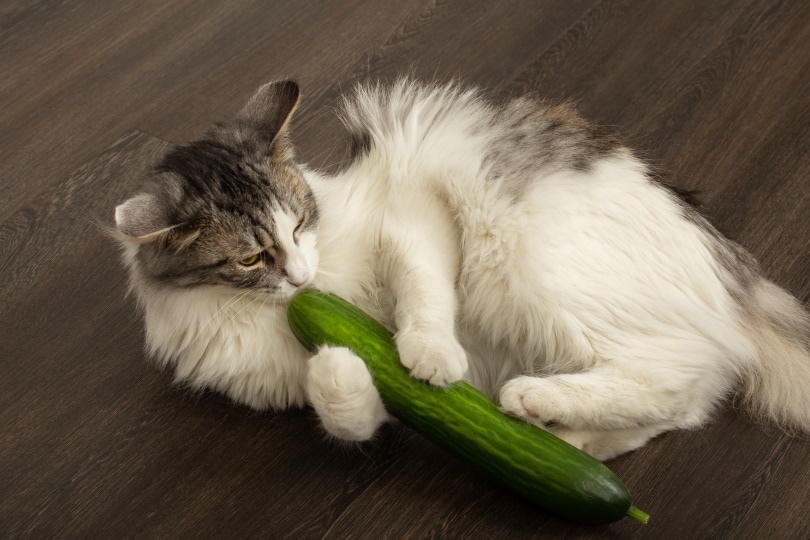
You Should Never Prank Your Cat
It might be fun to prank your family and friends, but they will understand and laugh about it later (hopefully). Cats, of course, will never understand. While we might laugh at their response, it is always cruel to intentionally scare your cat.
While at home, a cat’s defenses are down, and they feel comfortable and relaxed. As a cat owner, you have the job to protect your cat from harm and illness and generally take care of them.
When cats sleep or eat, they don’t expect anything terrifying to happen because they trust you and are usually feeling safe and secure in their homes. When you place a cucumber behind a cat while they are eating, you’ve essentially taken away that feeling of security and created an atmosphere of uncertainty and fear.
Cats will remember this incident, and in the future, it might make them apprehensive when it’s dinnertime. If your cat knows that you were the one behind the trick, you’re jeopardizing your relationship with them.
Just one unpleasant surprise like this can turn a cat’s fear into a phobia. Phobias might need a behavior modification program to treat, and it can take several months or even years to get your cat back to being well-adjusted and happy.
Then there’s the possibility of a cat injuring someone or themselves while frantically trying to escape the situation.
Even More Reasons That the Cucumber Prank Is a Bad Idea
So, if you aren’t convinced yet that playing the cucumber trick on your cat is a bad idea, here are four points to take into consideration:
- Emotional damage: Intentionally scaring cats can cause emotional harm.
- Behavioral issues: Creating anxiety-ridden situations could lead to behavioral and destructive behaviors.
- Stress: Stress is unpleasant in general, but it can also have a serious impact on a cat’s mental and physical health.
- Your relationship: The relationship between you and your cat is truly something that should be cherished, and if you break your cat’s trust, you’re potentially ruining that bond.
Conclusion
So, cucumbers in a salad are good, and cucumbers behind your cat while eating are bad. Regardless of the reasons that your cat is afraid of the cucumber, it’s still a bad idea to intentionally scare your cat. As funny as the reaction might be, you certainly wouldn’t want to risk your cat getting hurt, and you don’t want to see your entire relationship suffer as a consequence. It’s much better to laugh at your cat’s antics while they’re chasing a feather wand.
Your cat depends on you for everything—food, litter, entertainment, and especially love. You’re a lucky person to have earned the trust of a beautiful little animal, so do whatever you can to keep that trust for your cat’s entire life.
Featured Image Credit: tugol, Shutterstock


